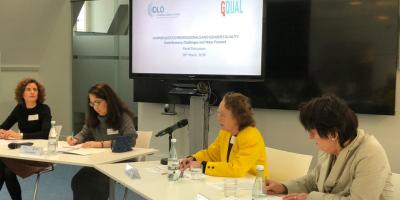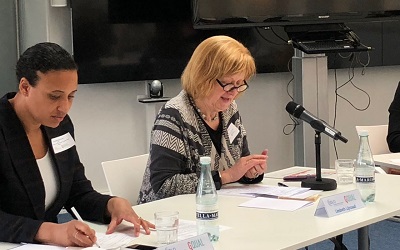
“To all women legal professionals: be as ambitious as you can, because we need more women with legal expertise. We need more champions of justice!”
Referring to IDLO’s #ChampionsofJustice anniversary campaign celebrating 30 years as an intergovernmental organization, a panel of influential female justice professionals encouraged other women to participate in the justice system as they explored ways to enhance gender equality. The event, organized by IDLO and GQUAL, was held on March 28, 2018 at IDLO’s Branch Office in The Hague.
There is broad consensus on women’s right to equal participation in all aspects of political and public life, but the reality is that women continue to be underrepresented in justice institutions. According to the latest UN data, women are outnumbered by men in the judiciary in about half of the countries of the world with declining proportions at higher levels up the judicial hierarchy. Women’s underrepresentation is even more pronounced at the international level. The GQUAL campaign has found that around 33 per cent of the 599 available positions in 91 international justice tribunals and monitoring bodies are held by women, a number which drops significantly if bodies dealing with women’s and children’s rights are excluded.
Gender equality in justice institutions
“Gender equality is most critical in courts that deal with issues at the lowest level,” Justice Teresa Doherty, a judge of the UN's Special Court for Sierra Leone, explained. “These are the most important courts because they often deal with the most number of people and with people who are facing the greatest challenges, including illiteracy and lack of education. They are the ones whose access to justice needs to be strengthened the most.”
Judge Doherty was the first and only woman judge in the South Pacific Islands region for 11 years. She was a judge of the Trial Chamber which gave the first judgement on use of children in conflict. Her opinion declaring forced marriage as a crime against humanity is the first recognition in international law of this crime.
According to Judge Doherty, many misconceptions about rape were only changed once women justice professionals researched and argued against prevailing myths and stereotypes. But ultimately, she said, it is not the judges who are the most important in ensuring that justice is done. Justice is brought about by the “victims and witnesses who are willing to come forward; we must remove the barriers for them.”
 |
| “Diversity and gender balance increase the quality of decisions,” said Prof. Liesbeth Lijnzaad, one of only three women judges at the International Tribunal for the Law of the Sea |
Though gender may initially seem less relevant in a tribunal dealing with technical matters, “diversity and gender balance increase the quality of decisions,” said Professor Liesbeth Lijnzaad, a judge at the International Tribunal for the Law of the Sea. Gender issues are also increasingly considered an important element of the law of the sea as it confronts human rights questions such as poor labor conditions and slavery at sea. Prof. Lijnzaad noted that the Tribunal had only one woman serving among 21 judges until she and another female judge were elected in 2017.
Professor Renée Römkens, Director of ATRIA and professor of gender-based violence at the University of Amsterdam, emphasized the importance of transparency in nomination procedures to international justice institutions, where “legal expertise in human rights and violence against women issues is considered a source of bias in the hands of women, but an asset in the hands of men”. She also highlighted the need to train judiciaries in gender issues, including gender-based violence.
Nani Jansen Reventlow, a human rights lawyer and director of the Digital Freedom Fund, emphasized that “the justice system is not neutral”. It is made up of people who work in the system and can influence its outcomes, and she called on them to “speak out for women”.
Hard quotas – yes or no?
A discussion ensued about the value of hard quotas to solving the underrepresentation of women in international justice institutions. Though some would have preferred to be elected solely for their merit, most speakers felt that quotas had enabled them to take up positions they would not otherwise have been considered for.
Justice Doherty told participants: “I know that when I was appointed a judge, I was a token woman. But don’t worry if you are a quota: you can do a lot when you get there!” Ms. Jansen added that the picture was unlikely to change unless “we get out of this situation where men dominate the decision-making processes about who is in or out”.
IDLO’s work on gender justice
IDLO works to promote gender equality and justice through non-discriminatory gender-responsive laws and institutions, enhancing women’s access to justice and increasing their legal empowerment to achieve sustainable development. To fully integrate gender in its work, IDLO is currently developing a new Gender Strategy aligned with its Strategy 2020. At the High Level meeting of the 67th Session of the UN General Assembly on the Rule of Law at the National and International Levels in September 2012, IDLO voluntarily pledged “to ensure women’s increased participation in the justice system”.
IDLO is a supporter of the GQUAL campaign. Launched in 2015 in response to women’s underrepresentation in international justice institutions, the campaign calls for measures to guarantee gender parity in positions involving international responsibility, including international tribunals and human rights bodies.

